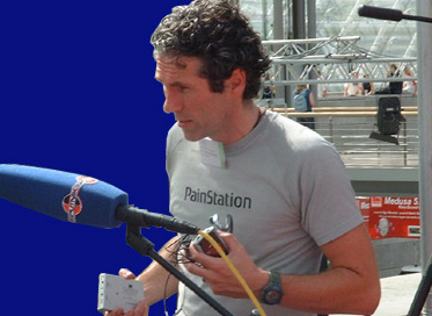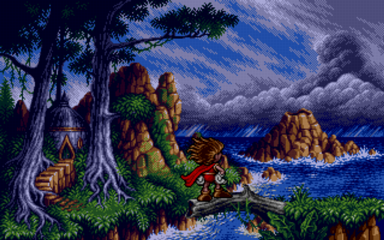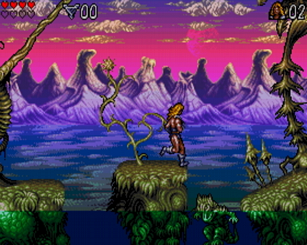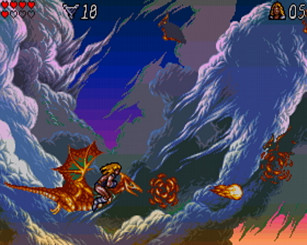|

In the early nineties Thalion Software realized games like
Lionheart,
Amberstar and Ambermoon, No Second Prize and Airbus A320. In Ninety-Four he ceased to
exist, but to date there are legions of gamers that recall the power of those
Amiga games, which drew impossible graphics such as impossible melodies. That is
why we have contacted Matthias Steinwachs, the musician who in that period of
experimentation concretely contributed to the greatness of Thalion. PF:
If I’m not wrong, your first soundtrack (Window Wizard for reLine, on Amiga) is
dated 1990. How have you been involved into this project and how your career as
a videogame soundtrack composer got started?
Matthias:
That’s right,
Window Wizard
was my first project (at least the first I was paid for). But today I would
prefer not to mention that music any more – come on, it’s really awful ? I got
that job randomly: A friend visited the CeBit in Hannover and talked with the
reline guys. They mentioned that they were looking for a musician, that friend
told them that he knows someone who is making music on his Amiga (yeah, guess
who…) – so I got that job. They paid 1.500 Mark (or 750 Euro) for it. Lot of
money for a poor student. So I decided that this was a better way to earn some
money then giving piano lessons…
PF:
In 1991 you began working with Thalion. You created the soundtrack for
Neuronics, a puzzle-game, and Airbus A320, a flight simulator. In this last
work, made for Amiga, we can see the main aspects who became like a signature of
you work: the great pathos, the emotional input, the epic atmosphere (the best
example is Lionheart). Also it’s possible to perceive in your music several
different influences: Airbus, for example, reminds Pink Floyd’s style. So, how
would you describe your musical background and who influenced you the most?
Matthias:
Honestly – that Pink Floyd thing wasn’t my idea, it was the order from the
Thalion-Boss (Fritz Kamincke), a great Pink Floyd-Fan. I never owned one record
of Pink Floyd (and I’m kind of proud of it). But he told me to sound like Pink
Floyd, so I listened to some of their records and copied the musical basics.
Lionheart is a different story. I was studying music to this time and was (and
somehow am) a great fan of lots of classic composers – so I was influenced by
Orff, Wagner,
Grieg,
Rachmaninov and some others. But in
former times I also played in different bands, from punk over metal to funk – I
think sometimes you can hear that also…
PF:
What kind of music do you like today?
Matthias:
Easy question – the good one. I like
songs with “fat guitars” as much as classic, Jazz as much as Electronic. I like
the Minimal Music of Philip Glass and Steve Reich, the old “Kraut Rock” of Birth
Control and the monumental sound of Emerson, Lake & Palmer, I like Earth Nation,
Blackeyed Blonde, H-Blockx, Ryuichi Sakamoto, Porcupine Tree, Element of Crime,
Whale, Plastic Voice, Tom Waits, Clawfinger, the symphonies of Schumann (and
also his songs) – and a lot more.
PF:
What’s the process to create a soundtrack? I guess every composer has his own
method. Into the movie business, for example, music and film are made in the
same time or, sometimes, the music comes first and helps the director to create
the moving images. What happens into the videogame business? Do you follow,
every time, the same working pattern?
Matthias:
No,
every work is different. Sometimes you get pics and scenes from the game you can
work with, sometimes you get the finished game and sometimes you first make the
music without having seen anything from the game – just the fact sheet from the
team and tons of mp3s with the note “it should sound like this”. So I do not
have a “method”. Some of the songs were created on my piano, other songs just
started with an interesting sound. Because I studied music I know a bit of how
to compose – composing is in the first place a craft as building a table. You
need to know the basics, how to use your craft stuff and then you can put a
little bit creativity on the top. You can’t wait for a divine inspiration. There
always is a deadline and you have to do your job every day. It’s not that
romantic people think it is. Sometimes it’s hard work. Most of the times. But
it’s great.
PF:
In 1992 you worked on the mythical Lionheart, one of my videogame obsessions.
The game is perfect in every detail and the atmosphere is incredibly fascinating
thanks, most of all, to your soundtrack. What do you remember about the
“Lionheart experience” and what were your influences?
Matthias:
La prima cosa che
ricordo è il poco spazio che avevo a disposizione per la musica e i brani. Oggi
questo non rappresenta un problema, non è necessario controllare quanto spazio è
rimasto sul DVD, ma in passato era un aspetto importante da considerare. Il
compositore aveva sempre lo spazio che i programmatori ed il graphic artist
avevano lasciato. E non era molto. Così, Erik (il produttore), spesso veniva a
dirmi: ”Bella musica, ma è troppo lunga, non abbiamo abbastanza spazio” così,
ero costretto ad accorciarla. Con i SFX è stato anche peggio, era necessario
concentrarne centinaia in pochi Kylobites; ne troverai alcuni non più grandi di
pochi bytes. Fu un duro lavoro, molto più duro con i SFX rispetto alla musica.
Inoltre Erik aveva un sacco di strane idee a proposito degli effetti sonori:
“Dobbiamo riprodurre il suono di un drago sputa fuoco, spingendo un carrello con
ruote di legno nel fango. E per favore, non più lungo di 2 Kb”. A volte mi
disperavo. Ma ricordo anche il grande spirito di amicizia e di squadra di
Thalion; fu molto divertente. Non era il grande, impersonale, macchinario che è
oggi l’industria videoludica… Noi siamo stati dei pionieri, eh sì!.
PF:
In 1993 Thalion created Ambermoon, a complex and sophisticated rpg which,
graphically offered an innovative mixture between 2D and 3D. There are many
similarities with Lionheart (even Valdyn’s character has a cameo). The
fantasy/fairy tale atmosphere is very important and, once again, your aching
soundtrack, finely orchestrated, it’s a surplus value for this Amiga’s
masterpiece. What do you remember about this experience?
Matthias:
I started with the
Amber-Trilogy when I converted the
great soundtrack of Jochen Hippel for Amberstar
for the Amiga. So I was quite familiar with the game and its follow up. What I
remember most are Eriks phone calls: “We need another five songs until the end
of the week”. Today you work a year and more on a soundtrack – in those days it
was normal to make it in a few weeks. Sometimes it was like an assembly line
production, with 2 or 3 songs a day. I worked with a program called “Sonic
Arranger”, quite easy to use, but with lots of possibilities concerning effects.
The original song and instrument discs are still in a box in my cellar. Don’t
know if the still work…
PF:
The Ambermoon’s story is deeply connected with Thalion’s. Originally this game
had to be the second part of a trilogy (Amberstar was the first) but Thalion
failed and the third part never saw the light. How did you react to that? Were
you, guys, ready for something like that?
Matthias:
We knew the day would come.
Lionheart was our last try to develop AND sell a game for the Amiga. Piracy was
the great problem in those days. We made great games, everybody liked them, but
nobody bought them. So we told the mags that we’ll have a last try with
Lionheart, but the pirates didn’t mind. So Thalion ran out of money and had to
close. I was disappointed, but I always worked as a freelancer and had enough
other jobs. So it wasn’t a financial problem for me (as for the other guys from
the team). Just an emotional one – a great era ended there…
PF:
In 1994 you began working with new software houses: the German Ikarion and the
French Lankhor (working essentially for PC). What can you tell me about this
part of your career?
Matthias:
I started for a company named
Kingsoft – mainly they sold games, the development was more a hobby of the boss.
But that part was getting bigger and bigger, and sometime the team decided to
found an independent label (as far as I remember) – that was Ikarion. I worked
for them for many years, we made a lots of games (can’t remember all of them).
Some guys of the team (as Franz Stradal or Marc Oberhäuser) later founded Studio
2 (Sacred) in Aachen – I still work with them. Lankhor was a funny story. I was
living in Berlin to this time, and they called me the first time one evening
around 8 pm and told me that they’d have a presentation of their new game the
next morning, but the title music would suck. So they need a new one within the
next 12 hours. So I composed a song within 6 hours, need another six to send the
few MB over the Internet – and they were satisfied…
PF:
In 1994, also, thanks to Psygnosis, you have been reunified with other two
Thalion’s talents: Erwin Kloibhofer and Henk Nieborg. The result is the
wonderful platform 2D “Flink”, for Megadrive and Amiga CD32. This game had lot
of (lovely) similarities with Thalion’s games. How did you feel working with
them again?
Matthias:
It
was quite funny. The producer was in Liverpool, Erwin in Austria and Henk in the
Netherlands. Remember – there was no Internet (ok, there was, but not very
useful) and you couldn’t send any ideas as an email-attach. So we sent packages
through Europe every day… half the time of the development of
Flink was used waiting for the next
package ? But the work in that team was great – they let me do what I want (some
songs really sound weird, with unusual rhythms and harmonies – you couldn’t do
that today). Flink is one of the few games that I’m still really proud of… And
Erwin and Henk are great dudes, always friendly with a great sense of humour.
PF:
One year later you worked again with Erik Simon on Albion, a Blue-Byte’
production for PC. That game combines together Sci-fi and classical Fantasy
elements and offers a mixture between 2D and 3D graphic. Do you think we can
define Albion like an Ambermoon’s follow up?
Matthias:
Sure. We’ve always had
plans for another part (and for a PC-Version of Ambermoon),
but then Thalion crashed. When Erik started his work at Blue Byte he remembered
these plans. Albion is not the official follow up, but it has a lot of the ideas
we had in mind for an Ambermoon sequel.

Flink: Matthias fold the Mega Drive soundchip to satisfy his need
to experiment and invent. |
PF:
In 1995 you collaborated with 4th Dimension software creating “Die Sage von
Nietoom” and till 2002 you worked almost exclusively with Ikarion (Hattrick,
Pinball Wizard, Demonworld o Demonworld 2). Amongst these games, or maybe
something else I did not quoted, do you have one you are more fond of, and why?
Matthias:
Some songs from
Demonworld are quite ok… as far as I
remember. But honestly I didn’t listen to that whole old stuff for the last 10
years or more. When a work is finished, it’s out of my mind. It happens that
someone says “Hey, you are the composer of the Game XY, and I loved that stuff”
and I answer “Oh really? Can’t remember that game at all”. Yep, I’m getting old
? I’m not really interested in the old songs. I have heard them so often during
work – that’s enough till the end of my life.
PF:
I listened the ambient remix “Drachenflug” (download),
out of Immortal 2, and I loved it! Have you ever thought to do the same with
other songs or to create a collection of your remix?
Matthias:
Uuh – yeah, I often thought to remix
all the other old songs. And if sometimes the days will have 48 hours, I’ll do
it. Promised! ? But I hope I can do it a bit earlier… I’d love to…

Lionheart - Stumpf (download):
when the soundtrack becomes epic. |
|

Lionheart - Drachenflug (download):
a poem of instrumental synthesis. |
PF:
The ending titles of Lionheart are the most touching thing ever seen into the
videogame business: the gamer feels really involved into it (most of all thanks
to “Don’t let the Amiga die…”) and he can perceive your passion and your “team
spirit”. After all this time you are working into the videogame business, do you
feel something is changed, during the years? Do you think, nowadays, we can find
other “teams” that work with the same passion you did, or that was something
like “once in a lifetime”?
Matthias:
It may be too easy to say
“20 years ago everything was better in the games industry” (although I think
that 20 years ago everything was better in the games industry ? ). It was easier
to test new concepts because the games didn’t cost millions of euro. We were
working in smaller teams, not having that pressure from above – we have been
more flexible, could try a lot of things and no one said “No, we can’t make that
because it’s too risky”. I made the music I liked most – today you have to ask
20 sales managers, the PR and lots of other people. It’s quite hard to make
music for games today – too much constrains, conditions and people who think
they know it better. Money kills passion. Mostly. But you can find that old team
spirit and the passion in the small, independent teams. As the one I’m just
working with. Just a few people, no pressure, just the fun and the passion. You
won’t get rich in those teams but have more fun. And that’s much more important
;).
PF:
What do you think about the contemporary Independent videogame business?
Matthias:
Thanks to Xbox Live and the iPhone
apps it’s getting better and better. Good platforms to present and sell your
stuff. So making games is no longer in the hands of the majors. (Making good
games anyway ?)..
PF:
Are you working on something right now and what are your future projects?
Matthias:
Right now I’m working on
a new project with some guys from the former “Studio 2” (who made
Sacred). It just has a
working title, and we have no idea if we will ever finish it. It’s a very
strange looking kind of RPG-Adventure with a prince, dragons, mermaids and
killing fishermen. I’ll let you know when it gets more real. I’m also working on
a game for the iPhone – looks nice. But I haven’t the time to do more, it’s just
actually a hobby – too much work for the radio and so on…
PF:
Tell us something about you: what’s your lifestyle? What do you do in your free
time?
Matthias:
Because my hobbies are also my work (music and radio), I’m working a lot – it’s
fun. The rest of time I’m training (sport is my obsession) – I’m member of 2
gyms and training 4 times the week with a personal trainer (and the other days
alone ? ). I’m also running, biking and – from time to time – practicing Kendo.
PF:
Thanks for your time Matthias: do you have a message for projectfirestart.org
readers?
Matthias:
Yeah. Never play poker with a man who has a first name sounding like a city.
Interview released on 12/06/2010
|


